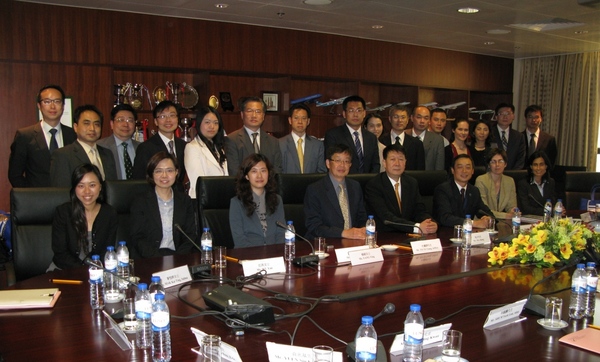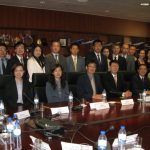
The aeronautical authorities from mainland China, Hong Kong and Macao met in Macao on 14 April 2011 for the annual “Tripartite International Air Law Meeting” to update each other on aviation legislative development over the past year, introduce the procedures for the applicability of multilateral conventions in the three places, as well as exchange opinions on the content and the eventual applicability of “The Convention on the Suppression of Unlawful Acts Relating to International Civil Aviation (the Beijing Convention)” and “The Protocol Supplementary to the Convention on the Suppression of Unlawful Seizure of Aircraft (the Beijing Protocol)”. The meeting enhanced the communication and exchange on their civil aviation laws and regulations. The healthy and orderly development of aviation is reliant on the protection by well-established legislation. Since Hong Kong and Macao have become two special administrative regions of China, the aeronautical authorities of mainland China, Hong Kong and Macao saw the need to create a communication and exchange mechanism to understand the latest developments of aviation laws and regulations in the three places and to coordinate among themselves on the formulation and amendment of multilateral conventions relating to aviation. It was therefore decided among the three sides that a regular “Tripartite International Air Law Meeting” should be convened every year for exchange of information, and to be held by each of the aeronautical authorities in turn. In the presentation by the Civil Aviation Authority of Macao SAR (AACM) on the latest development of Macao's aviation laws and regulations, AACM explained that reviews are made on the existing legislation from time to time and amendments will be introduced when necessary. The latest developments were the Despacho of Chief Executive No. 295/2010 published in 2010 regarding the flight protection area around the airport, heliports and navigation aids, and the Executive Order No. 8/2011 published earlier this year which approves the Air Navigation Regulation of Macau; AACM also gave a brief overview on the laws and regulations which are currently under legislative process, namely the “Aerodrome Certification”, the "Minimum Air Transport Passengers Rights in Case of Denied Boarding and Cancellation or Delay of Flights" and the "Aviation Accident and Incident Investigation and Aviation Safety Information Protection Law"; furthermore, AACM is studying the need for new laws and regulations in the field of aviation security. The three delegations also discussed the content and the eventual applicability of the Beijing Convention and the Beijing Protocol. In September 2010, the "Diplomatic Conference" held under the auspices of the International Civil Aviation Organization was convened in Beijing. The Conference defined new and emerging threats that are not covered under the Montreal Convention of 1971 and the Hague Convention of 1970, and finally adopted two new counterterrorism treaties devoted to improving aviation security, named as the Beijing Convention and the Beijing Protocol. These new treaties have reflected a new concept according to which the states are required to, for example, criminalize the unlawful and intentional use of an aircraft in service for the purpose of causing death, serious bodily injury or serious damage to property or the environment; criminalize the release from an aircraft in service of any biological, chemical, and nuclear weapons that cause death, serious bodily injury or serious damage to property or the environment; criminalize the transport of biological, chemical, and nuclear weapons and related materials by air; prosecute and punish those who organize or direct others to commit acts of terror; cooperate between each other on the extradition of those who seek to commit acts of terror, among others. The Beijing Convention and the Beijing Protocol will significantly strengthen the existing international counterterrorism legal framework by expanding the scope of crimes as well as promote the cooperation between states on extradition. Presently, the Beijing Convention and the Beijing Protocol are not yet in force. For the two treaties to be fully applicable to Macao SAR, they need to be extended to Macau SAR by the Central Government after seeking the opinion of Macao SAR. Besides, amendments should be made to the existing Criminal Code and the relevant law on prevention and punishment of terrorism crimes, or a new criminal legislation should be promulgated. The meeting was held in AACM's office. Participants were the representatives from the Department of Treaties and Law of the Ministry of Foreign Affairs of China, the Civil Aviation Administration of China as well as the Division of Policy and Regulations of their regional offices, the Department of Justice of Hong Kong SAR, the Civil Aviation Department of Hong Kong SAR, the Security Bureau of Hong Kong SAR, the Law Reform and International Law Bureau of Macao SAR and AACM.


